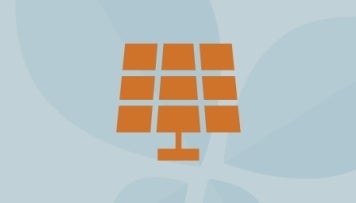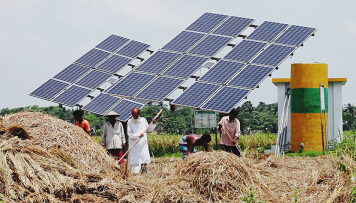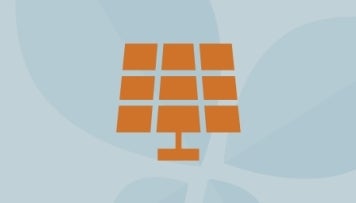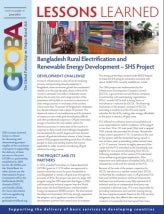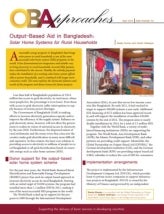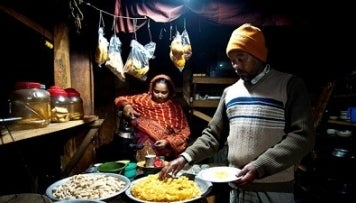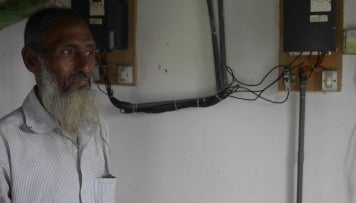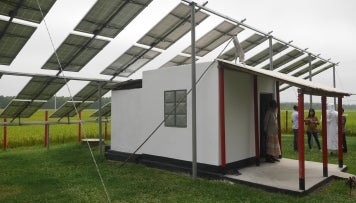
In 1997, when Dr. Fouzel Kabir Khan became the CEO of Bangladesh’s newly inaugurated Infrastructure Development Company Limited (IDCOL), he wasn’t at all sure the new venture would work out—particularly after he heard that his counterpart in Pakistan was now in jail.
“That was comforting,” Dr. Khan joked while recounting his experiences with members of the Global Partnership on Output-Based Aid (GPOBA). Dr. Khan, who after working at IDCOL became the Secretary of Power Division for the Ministry of Power and Energy, Government of Bangladesh, now works as a private consultant.
During his presentation, Dr. Khan described how in the face of low expectations and daunting odds, he and his colleagues at IDCOL developed their organization and with grants from development partners, including GPOBA, created a solar home system project that brought new access to clean energy in Bangladesh. Today an estimated 3 million solar home systems have been installed throughout the country, and the project has been acclaimed as a successful model for other developing countries.
“We had to create an island,” said Dr. Khan in describing the beginnings of IDCOL. “Bangladesh in those days had serious issues of transparency and corruption.”
To avoid these problems, Dr. Khan and his colleagues used a three-prong strategy in staffing their organization:
1. They sought out new talent for their employees. “We did not recruit anyone with experience,” said Dr. Khan. “With experience comes baggage. You’re experienced not only in work but also in corruption.”
2. They outsourced the vetting process and used codes so that the process remained anonymous.
3. When new hires were brought on, they signed contracts with an explicit zero tolerance for corruption, and their salaries were structured in such a way as to create disincentives for corruption.
Dr. Khan went on to describe how IDCOL became involved in solar home systems, which at first seemed a counter-intuitive move for an organization set up for large infrastructure projects.
Another challenge was that Dr. Khan, an economist, and his colleagues, who had been hired because they had no experience, lacked concrete knowledge of microfinance or how to run small-scale projects targeted to individual households.
Finally, in 2001, solar energy seemed to be for, as Dr. Khan memorably put it, “yuppie generation alternative lifestyle” clients, rather than economically disadvantaged people in rural areas. And the fact that in those days solar energy was relatively expensive only seemed to confirm that general impression.
“When the Bank approached us, I didn’t know much about it and was not very impressed,” he said. All that changed, however, when Dr. Khan donated a solar home system to the mosque in his ancestral home village, a remote island in the south of Bangladesh. A few weeks later, he received a postcard from the mosque saying that the system was a great help. “Then I thought maybe it could have some benefit,” he said. “So let’s talk.”
Initially, IDCOL’s skeptical board approved a pilot project of 500 solar home systems. After the success of that pilot, the program expanded. “Our target was to achieve 50,000 solar home systems by 2008,” said Dr. Khan, “but it was done in two years time from 2003 to 2005, 3 years ahead and 2 million dollars below budget.”
To protect the program from the influence of vested interests and the possibility of corruption, IDCOL set up several independent committees with members of the public and private sector to oversee training and operations. And to make the solar home systems affordable, they were subsidized with grants and credits.
Dr. Khan vividly described many of the initial difficulties his team faced. Few people in rural villages knew what solar lighting was. “They thought it was magic or voodoo,” he quipped. So IDCOL mounted a massive advertising campaign, using handbills, billboards, TV spots, and even dramas featuring popular actors. They also trained individual household members in how to use and maintain their solar home systems. Interestingly, Dr. Khan said that about 80% of their clientele were women.
“The men are out in the field working,” he explained. “They are not interested in filling water in a recycled battery or cleaning the solar panel. So women have a really, really big role.”
Another issue was the chance of misappropriation, that a client might claim an installation subsidy without actually putting in the solar home system. To head off that possibility, Dr. Khan’s team would travel to rural areas to inspect the systems as well as solicit feedback on how they were working. Initially that work was very difficult since there were only a few systems and they were spread out over a large area.
Today, however, solar home systems are widespread in Bangladesh, and thanks to developments in the green energy sector, they have become an affordable option for consumers.
Dr. Khan noted that one of the keys to the project’s success was an attitude of “healthy suspicion,” in other words, constant questioning to make sure that operations were running smoothly and effectively. As Dr. Khan said: “Suspicion with a common goal is actually a good thing.”
